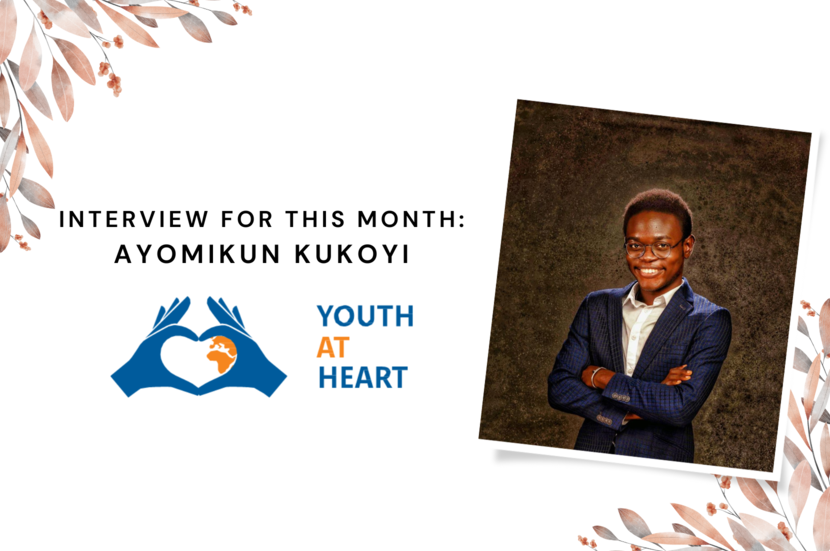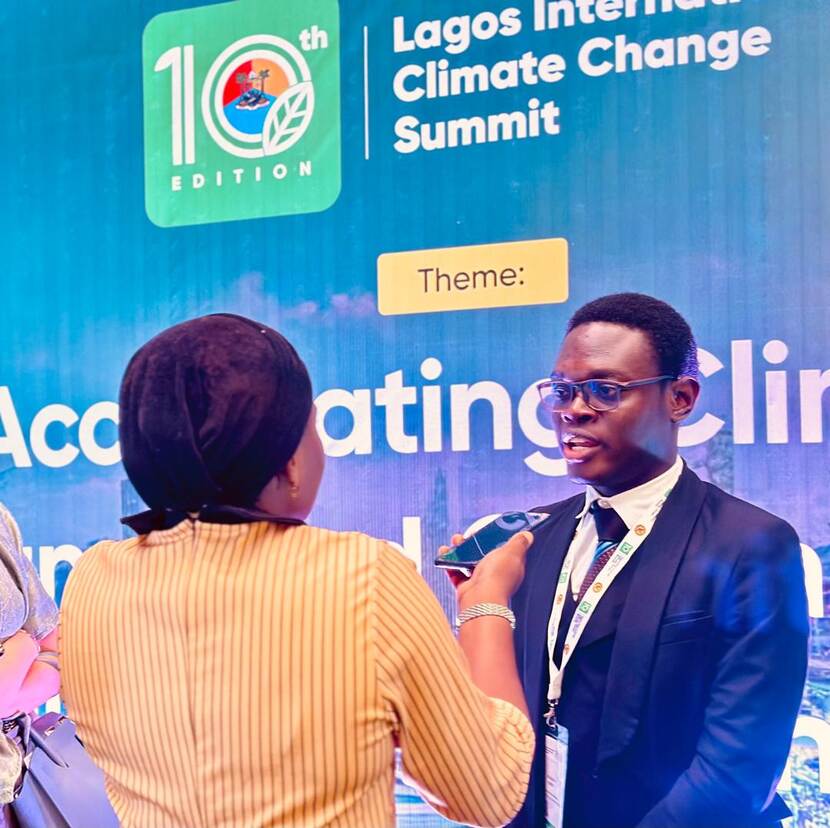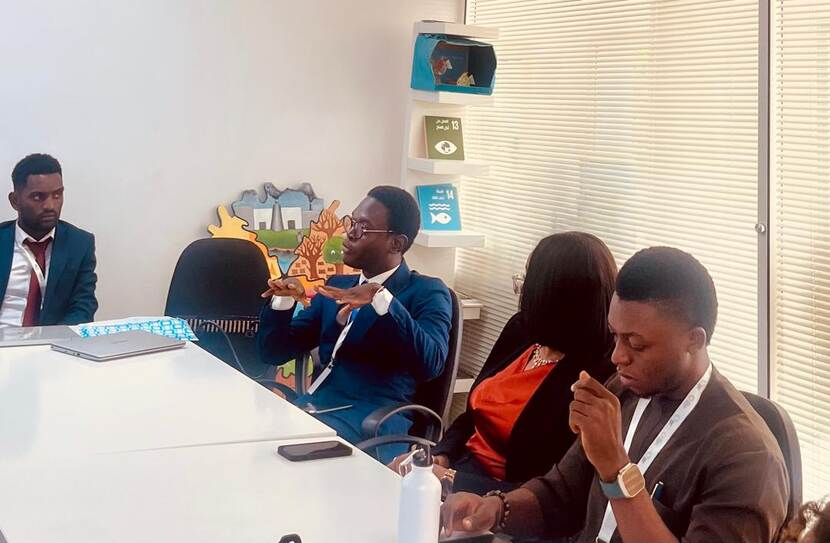Interview with Ayomikun Kukoyi from the Youth Sustainable Development Network
Youth at Heart is all over the world, both within the work of the Dutch Ministry of Foreign Affairs and beyond. This interview series gives a spotlight to relevant youth leaders across the world. What are their experiences, their recent thoughts, and their future plans?
The fourth interview in this series is with Ayomikun Kukoyi, Director of Research and Advocacy at Youth Sustainable Development Network. Ayomikun was involved with developing ECO-LEARN Nigeria; an initiative that came about in collaboration with the Dutch Consulate in Lagos.

Can you elaborate on your background?
I’m a lawyer and finished my education in March of 2024. So I’m a fresh off the bat lawyer. Other than that, I’m an active member of the Youth Sustainable Development Network (YSDN), a worldwide network that originated here in Nigeria. In my undergrad, I participated in what’s called ‘Model United Nations’ (MUN), which are simulations that engage many students each year, helping them to learn more about the principles of the UN and how it functions. So that opened up my world to sustainability and being a globally conscious person.
There are ranks and steps in this whole MUN program, and sometimes positions open up for secretary, or chairs or what not. I applied for the position of a chair of UNICEF organization, but got rejected unfortunately. At this time, YSDN was about a year old and they posted a call for different directors for the 17 SDGs – just after I got rejected for the other position. I applied for the position of SDG16, because that centered around the experience that I already had.
This was in 2019, and I succeeded in obtaining the position. In general, after I became a director with YSDN, I rose through the ranks. Not all the directors made it into the main team, but eventually I did, just in time for their Youth Sustainable Development Conference. For the conference in 2021, I became the Head of Human Resources.
As such, I had to come up with application forms, modality systems, delegate participants, but I also worked on case studies surrounding the conference. Especially seeing as these case studies are the huge difference maker between us and other conferences, so I was fortunate to work on those.
So it seems like you recovered quite adequately from the initial rejection you got!
Yes it’s true, but it was definitely hard at the time. Also the people around me were quite shocked that I didn’t get the position, because all my qualifications lined up. Initially I felt bad, but at the same time it helped me a lot with my YSDN application, which evidently ended up very well.
The overall processes for obtaining the position with MUN and YSDN were basically the same. An application, an interview followed, and then you end up with the position or not. I ended up with the YSDN position which I probably wouldn’t have obtained if I didn’t have the experience of the rejection for the LMUN position. It didn’t beat me down, and I have to admit that my friends played a big role in that.
What you’re working on right now is sustainable development and climate change. How did this change from SDG16 come about?
Like I said, my first position with YSDN was as director of SDG16: Peace, Justice and Strong Institutions. While I was working on this, for some weird reason, I was assigned to the Energy & Resilience team for the purpose of the conference as it was thought that my potential was restricted by focusing too much on just one SDG.
They offered me the chance to gather more knowledge through the team, and as such I helped coach delegates that participated in the aforementioned conference. These delegates had to formulate solutions to the case studies – or proposals – surrounding energy and resilience topics. It was sort of a competition, with a $5000 cash prize attached to it for the winner – to implement their project. I helped some of the delegates with formulating their case studies and basically mentored them, because I already had experience with going through this process myself.
It was fascinating to get acquainted with the energy team, because it showed how interconnected all the SDGs were in terms of knowledge and experience necessary. So I think from then on, I became more familiar with those types of projects within YSDN.
Now, fast forward to 2022. In this year, our relationship with the Dutch Consulate in Lagos was officially established. This came in right on time, because I had gathered a lot of knowledge and experience working with the Energy & Resilience team. With the consulate, I could therefore participate in conversations regarding climate change and sustainable development.
I sometimes found it difficult to let go of my legal background and identity in this new space, but I was able to trust the process and allowed myself time to grow. Especially in terms of gathering knowledge in this new space, but also to find common ground between my legal background and this new field. I found it wasn’t that far off!
Most of my internships were in the public sector, with groups that couldn’t access justice. They didn’t have the resources to hire private lawyers, and I actually found a common ground in relation to the climate action space – the ones who contribute the least are hit the hardest and can do little to fix it.

You mentioned the Dutch Consulate. What is the relationship between YSDN and the consulate?
Initially, I didn’t think we would have any type of relationship with such a diplomatic body. But then we had the CEO of YSDN get sponsorship to go to the COP. Afterwards, we continued conversations with them and now we particularly have good contacts with Leonie: an amazing human being! She has been so fundamental in establishing the relationship.
In 2023, we had a meeting with her at her house. She was so gracious to invite us in and have lunch; it was us and some other sustainable organizations. Basically we sat down, and she wanted to hear what we have been doing as an organization. What challenges have we faced? How could she best use the platform of the consulate to integrate the youth perspective into climate action in Lagos, Nigeria?
Fortunately, under the umbrella of YSDN, I already reached out to the Ministry of Education of Lagos to create a program for unorthodox education allowing for non-traditional career paths for the public school students. This was because YSDN had just finished a similar program for a private school but using MUNs. Thus, we didn’t see why public schools couldn’t have this opportunity.
So, we wrote a proposal and had several meetings with different people within the ministry to see what opportunities there were to explore in relation to this, but it ultimately fell through the cracks. Speaking about this to Leonie, she proposed to have a consultation with many different climate youth groups within Lagos to see what we could do in relation to climate.
The consulate facilitated the consultation in terms of space and food, or general practicalities. So then, we – the 26+ groups of climate youth – gathered together in Lagos, Nigeria at Freedom Park, for the first time. We were tasked with formulating a concept note which talked about their ideas in relation to climate. It was simply putting the groups together and let them discuss whatever they wanted, particularly in relation to climate. What is needed in Lagos, Nigeria? One of the unanimous decisions or outcomes of this consultation, was CLIMATE EDUCATION.
In 2023, Leonie reached out again and indicated that she spoke about YSDN to the governor of Lagos State. She was also introduced to the director of the Public Service Staff Development Center (PSSDC). The PSSDC basically trains public servants and conducts their promotional exams. He indicated that his staff was interested in environment and climate related issues.
He was interested in developing a curriculum on climate education, which was also one of the intents and outcomes of the consultation with the different youth groups. Once the representatives of Lagos State were involved, we could really start developing the curriculum.
Would you say the consultation process and curriculum development was a good example of meaningful youth participation?
Because of my background, particularly the university I thankfully went to, I was already able to navigate these types of conversations. For example, I was one of the first African persons within YSDN to become an associate at the JET ESCP, so I already had quite the understanding of how to approach the conversations with high level partners.
It’s a certain way you have to present yourself and speak, and the consulate recognized that we didn’t necessarily need any form of training anymore in this regard. So in that sense, drawing on our expertise and simply facilitating where necessary was definitely the right approach in this case.
Can you elaborate a bit more on ECO-LEARN, how it came about, and what it consists of?
Initially, the two parties that I mentioned before spoke to us and we already found a common ground on our ideas surrounding climate education. However, it wasn’t clear what exactly the curriculum should consist of: it had to become a curriculum for public servants and not particularly for students. It draws comparisons, but it’s evidently different.
In terms of curriculum for students, there is actually very little space to integrate significant changes. But we still wanted to reach the students. We then thought, how can we do so through the means of public servants? How can we overcome this hurdle without being direct about it? We decided to focus on public school teachers, aiming to make their background adequate enough to convey the gravity of our climate problems to the students.
Me and another member of YSDN, Omatseye Carpe, started developing the curriculum. We sent it over to them for the review, and initially didn’t hear a lot back. But then, we could again draw on the network of the consulate and use their ability to facilitate. They followed up with the Director of PSSDC, which is easier to do when you have diplomatic status – or at least so it seems. As soon as the contact picked up again, we had meetings on what refinements were needed in terms of the curriculum and the overall project.
How do you make sure the knowledge reaches the students?
A lot of strategic decisions had to be made in order for the program to be effective. We decided that we would work with an application form with questions that gave us a feel on the intrinsic motivations of the public school teachers that applied.
We had 100+ applications and we selected 40 teachers, who demonstrated a visible commitment to sustainability and climate education, and already ran parallel programs similar to this in their schools. So the sessions could build on their knowledge and leveled exchange between them.
Also, the assignments that teachers have to do within the ECO-LEARN programs directly integrate work with their respective students. This way, we make sure that the knowledge that they had and the knowledge that we supplied them with is directly transferred to their students – even within the somewhat strict curriculum.

How does it work legally? How’s the relation with Lagos State?
Lagos State values the fact that their teachers are trained adequately, as do most governments. However, they can’t be at all the places at once. So we went into a partnership with the PSSDC and the Ministry of Environment as the permission of the district heads of the 6 educational districts in the state and eventually got everything sorted out.
They definitely had demands in terms of tweaking the curriculum, which in this case regarded adding a module on circular economy and waste management, which we had already in the curriculum but added more layers to it.
How did you feel about that?
It wasn’t really that much of a big deal. It ties back to YSDN as an organization, because we were already involved with circular economy as a concept outside of the ECO-LEARN project, seeing as we were working on the CoolCycle Project, which embodies that concept. So I knew it wouldn’t be a problem; it built on things we already had and knew.
They wanted us to include something on waste management, but we also already had something on that within YSDN. So it was a matter of getting back to that and integrating it. The issue of climate education with YSDN wasn’t the first time we worked on it. However, before our ideas weren’t accepted possibly because we were young people.
With Lagos State, and through the facilitation of the Dutch Consulate in Lagos, we see that we are actually listened to more carefully. There is still work that needs to be done, don’t get me wrong. Because, ideally, we shouldn’t need a consulate or whoever to be listened to. However, for now, this is still the case.
What are venues where youth can be of value in Nigeria more broadly?
In a vast number of ways, especially on the topics we’re talking about. Young persons are making strides that are unimaginable, in terms of anything; climate change, energy, sustainability. I have found that the people we come across in governments haven’t been brought up with or exposed adequately to these topics, and sometimes lack the necessary knowledge and awareness to navigate this space.
Young people that spent their whole undergraduate, writing their thesis, papers, articles, working on related projects etc. are better equipped. This needs to be valued. It’s something as small as putting people in a position of advisor on these particular topics. At YSDN, we simply have a group of young people that come together and are intrinsically motivated to work on climate change issues and broadly the SDGs.
For example, in Nigeria there is a problem of food waste among farmers that stems from a lack of preservation mechanisms. So we came together with an engineering company, and identified that we could make use of generators that were formerly believed to be at the end of their lives. Now, they are employed in circular and renewable means, which have resulted in an increase of 100% of the produce of the farmers that make use of the solution.
These farmers now even sell internationally, because the quality of the produce is so good. If young people come together, and governments believe in them, innovative solutions can be found to issues such as this plaguing our country. This particular solution to food waste was a perspective that the government didn’t have. Now, they do, simply because of young people. These are basic ways to start with including youth meaningfully in Nigeria.
This whole experience with YSDN, ECO-LEARN and the transition between legal and sustainable: how do you take it forward in your life?
Something that I’ve learned from these experiences is that coming out of your comfort zone doesn’t have to be as grand as speaking with 100 new people at the same time. It can just be as minute as expanding your own knowledge base outside of what you’re used to.
My road with YSDN has been about expanding my boundaries mentally and physically. The change from the legal field to climate, energy, and transition was something that was challenging, but I was able to get what I needed at that time to be able to perform accordingly. Push your limit, but also see that you do so in the small things.
For example, my first project with YSDN ended in the Energy Sector, which I wasn't used to, then my experience at the JET ESCP, where my first task was on venture capital: a concept I never heard of before. Just getting acquainted with that and with all these new concepts helped me so much. And then, moving to the physical aspect of moving out of my comfort zone: I’m not necessarily a social person. But, being with YSDN challenged this, which greatly developed my networking skills.
Also, Having to juggle YSDN with law school also fits in this area, or even some other board positions that some would say were impossible to do alongside each other.
What did it teach me? It taught me that the human limit is really just a construct of our own minds, it’s not really something that exists if you really look at it. That’s definitely something that I’ll take forward. If things get difficult, I now know that I can do it anyway. It’s just the way you position yourself towards the challenge you have in front of you.